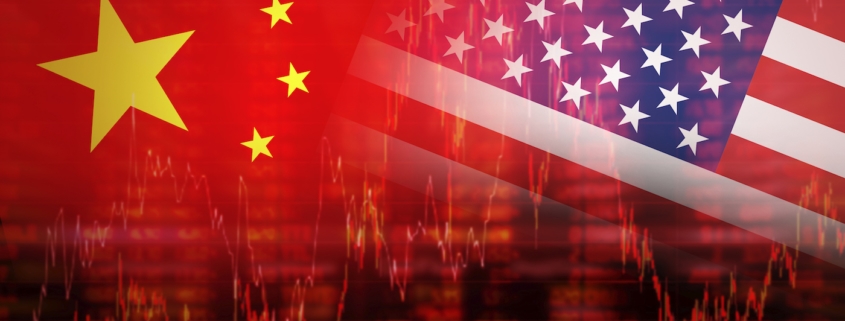On November 17, 2021, the U.S.-China Economic and Security Review Commission held a virtual public release of its 2021 Annual Report to Congress in Washington, DC. This report provides “a review of economics, trade, security, political, and foreign affairs developments in 2021” with a focus on the “CCP’s economic and technological ambitions, the Chinese government’s evolving control of the corporate sector, U.S.-China financial connectivity and risks to U.S. national security, China’s nuclear forces, Chinese military capabilities and decision-making for a war over Taiwan…”
Read moreAmericans already feel the effects of supply chain shortages even before the traditional holiday shopping season starts on Back Friday, the day after Thanksgiving. Ads by retailers are advising consumers to do their holiday shopping early to avoid not being able to get the items they want to give as presents. Even if you buy early, holiday shopping won’t be easy this year. Since the supply chain shortage is predicted to last well into next year, the solution is to buy less and buy American.
Read moreMajor retailers and thousands of small businesses face a bleak holiday season without Chinese goods to sell because of the long lineup of container ships from China waiting to enter major ports to offload their cargo.
It seems like Americans have to learn lessons the hard way. During the early stage of the COVID pandemic, there was a serious shortage of masks, ventilators, and other PPE equipment and supplies because we had become dependent on China for these goods. Now, American consumers are experiencing shortages in common consumer products at retail stores, and manufacturers are facing long lead times for components, ICs (chips), and other parts and assemblies. These shortages are projected to get worse before they improve sometime in 2022.
Read moreAs more and more American consumers turn to buying products online instead of in person at brick-and-mortar stores, they become increasingly vulnerable to counterfeit goods and are unable to determine where the products have been made. Country of Origin information is missing from the major online platforms so consumers are unable to fellow Americans by choosing to “Buy American” for products sold online. Without knowing Country of Origin, they are not able to boycott buying products made in China by slave labor or protest the ethnic cleansing of the Uyghurs by the Chinese government.
Read moreWhen my first book, Can American Manufacturing Be Saved? Why We Should and How We can was published in May 2009, I introduced it as a speaker at the Del Mar Electronics & Design Show in San Diego, CA and displayed it at my company’s booth. One of the persons who stopped by and bought my book was Adrian Pelkus, President of A Squared Technologies, Inc. and leader of a group called the San Diego Inventors Forum. Adrian invited me to the next meeting of the group and I accepted his invitation. Since June 2009, I have regularly attended SDIF meetings and became a board member when it was formally incorporated in 2014. Our meetings provide information that helps inventors take a product from design concept, fundraising, producing, and successfully marketing the product. I give an annual presentation titled “How to Select the Right Processes and Sources for Your Product” and we hold an annual inventors contest with cash prizes. We haven’t held in-person meetings since the COVID pandemic shutdown started in March 2020, but will start meeting again this fall.
Read moreSeptember 16, 2021 marks the 10th anniversary of the America Invents Act (AIA) at the Decade of Stolen Dreams Inventor Rally organized by US Inventor, Inc., a non-profit association of inventors devoted to protecting the intellectual property of individuals and small companies. It represents its 13,000 inventor and small business members by promoting strong intellectual property rights and a predictable U.S. patent system through education, advocacy and reform.
Read moreOn June 29, 2021, the U.S. International Trade Commission (USITC) released a report on the economic impact of the many bilateral, regional, and multilateral trade agreements that the U.S has signed since 1984. These include NAFTA, that went into effect in 1994, the multilateral trade deal that created the World Trade Organization in 1995, as well as bilateral trade agreements such as KORUS (Korea-U. S). It also examined the one-year-old U.S.-Canada-Mexico Agreement, which replaced the original NAFTA. However, it did not examine the effects of the agreement struck by the United States to pave the way for China to enter the WTO in 2001.
Read moreThe panels on the third day (March 25th) of the virtual CPA conference highlighted how the technology industry contributes to national security and the economy as well as how a currency policy would contribute to President Biden’s “Build Back Better” industrial strategy.
Read moreThe second day of the CPA virtual conference held March 23-27th featured two panels:
- the first on the topic of “Reforming Corporate Taxation to Help Reshore Our Industries,” and
- the second on ”Buy American.”
In the first panel, the focus was on whether or not additional tax reform is needed by Congress to make sure that tax loopholes that currently favor multinational corporations over domestic companies will be closed.
Read moreThe Coalition for a Prosperous America held its annual trade conference virtually for the first time on March 23 – 26, 2021. I had the pleasure of attending the annual trade conference in person six years in a row when it was held in Washington, D. C., but last year’s conference had to be canceled on short notice because of COVID shutdowns. This year’s virtual conference was free to all CPA members and the program ran from 11 AM – 4 PM ET each day. The conference was a huge success because of the valuable content of the sessions, lack of technical glitches, and Melissa Tallman’s hard work.
Read moreINQUIRIES
Media: PR Department
Partnership: Marketing
Information: Customer Service











